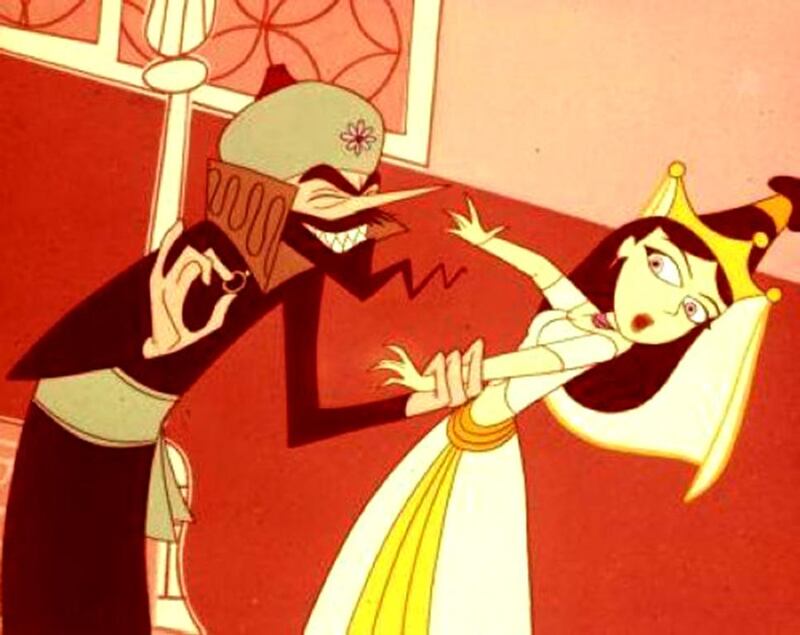The title of the new book by Dr Jack G Shaheen – A is for Arab: Archiving Stereotypes in US Popular Culture – sums up how the 75-year-old media critic and writer has spent his career: identifying and contesting damaging stereotypes of Arabs and Muslims in American media.
Shaheen will be talking about his new book at NYU Abu Dhabi on Wednesday. The book features photographs of objects and materials from his lifelong collection of representations of Arabs and Muslims in US popular culture. He and his wife donated the collection to NYU, which created the Jack G Shaheen Archive at Tamiment Library & Robert F Wagner Labor Archives.
Shaheen, the son of Lebanese immigrants to the US, first brought attention to negative stereotyping of Arabs and Muslims in the American media with the book Reel Bad Arabs: How Hollywood Vilifies a People from 2001.
He is a former news consultant on Middle Eastern affairs for CBS News and a distinguished visiting scholar at New York University’s Hagop Kevorkian Center for Near Eastern Studies. In 2008 he published Guilty: Hollywood’s Verdict on Arabs After 9/11.
Shaheen lives with his wife in South Carolina and has been a charter member of the Arab-American Anti-Discrimination Committee since 1980 where, along with his wife, he provides scholarships to young Arab-American media professionals.
Where does your passion about changing the perception of Arabs and Muslims in the US come from?
Unlike most Lebanese-Americans, I don’t have a gene for business; I must have inherited a gene for justice from my mother. In the US there is this horrible injustice, this constant vilification of all things Arab and Muslim, which in the 1970s was primarily Arab. And we are the world’s leading exporter of entertainment. An ugly Arab Muslim here is an ugly Arab Muslim worldwide. Arab equals the Muslim equals the evil enemy other.
When we had children they were exposed to cartoons where my favourite characters like Mickey Mouse and Donald Duck were beating up Arabs. I decided to write about it. Maybe nothing would have happened had I not met so much resistance.
I wrote an article The TV Arab after coming back from teaching at the American University in Beirut, where I went in 1974-75 on a Fulbright grant.
For three years, I kept sending it out and the letters of rejections were strange. The resistance to it only made me more determined. There was no literature on this issue, which obliged me to go to other publications and learn how other groups were vilified historically – Asians, blacks, Jews.
So looking at where you started out and the situation today, how far would you say you have come?
The problem persists but we have come a long way. Courses are being taught on the stereotypes, I have hundreds of published articles, scores of dissertations are written.
Reel Bad Arabs continues to do well and everyone in film studies is aware of it. And the film based on the book is shown all around the world.
But even with this available knowledge, it just shifted to the vilification of all things Muslims or Islam.
What’s the background for your new book, A is for Arab?
It’s based on my collection of more than 4,000 collectables at NYU, everything from TV shows, to movies, comic books, toys and editorial cartoons, all housed at the NYU. Until the NYU came by, we had items in both bedrooms and in the living rooms behind our sofas [laughs]. There is also a travelling exhibition based on the book, which is going around the country mostly to universities.
It’s one thing knowing that Arabs and Muslims are perceived negatively, but you keep confronting that on a daily basis. How does that affect you?
First of all, it hurts. Secondly, it makes me more determined. So I try to take the pain and transform it into action. I feel helpless at times, like after the Boston bombings. I regret not having the opportunity to speak up on these issues on radio and TV because I can bring some balance to this. The reason it concerns me is not because I want to be on TV but because I want to bring some intelligence into the argument and defuse some of the prejudices, but I can’t do it if I am silent. That’s one of the reasons for the scholarships, to create a presence where our voices will not be silenced.
[ artslife@thenational.ae ]





